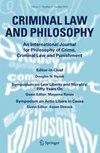Idealizing Abolition
IF 0.7
Q2 LAW
引用次数: 0
Abstract
Abstract The United States system of policing is in drastic need of change. Some recent critics have encouraged that we avoid trying to repair the system—and abolish it altogether. In advancing this position, they often invoke ideas of “dreams,” “speculative imagination,” and “horizons” to guide efforts at fixing the problems of policing. In this essay, I caution against the overuse of this sort of idealized discourse in debates about policing. Specifically, I show how idealizations risk being counterproductive with respect to abolitionists’ activist goals, in that they suggest that if abolition is desirable, approximating abolition is also desirable; fail to clarify what the conditions of application of their view are; and operate without the feasibility-sensitivity that one should expect from a non-evaluative position. My goal is not to suggest that our system of policing is fine as is. Nor is it to diminish the importance of having a long-term revolutionary vision. By pointing out the ways in which the idealizations invoked are inconsistent with abolitionists’ activist agenda, I hope to help clarify the merits of police abolition as a guiding strategy for change and caution against the use of certain forms of idealized thinking in our efforts at police reform.理想化废除
美国的警务制度急需变革。最近一些批评人士鼓励我们不要试图修复这个体系,而是彻底废除它。在推进这一立场的过程中,他们经常援引“梦想”、“投机想象”和“视野”等概念来指导解决警务问题的努力。在这篇文章中,我警告不要在关于警务的辩论中过度使用这种理想化的话语。具体来说,我展示了理想化是如何与废奴主义者的激进目标背道而驰的,因为他们认为,如果废除是可取的,那么近似废除也是可取的;未能阐明其观点适用的条件是什么;而且没有可行性敏感性,这是一个非评估性职位应该期望的。我的目的并不是说我们的警务系统就像现在这样很好。这也不是要削弱拥有长期革命愿景的重要性。通过指出所援引的理想化与废奴主义者的积极议程不一致的方式,我希望有助于澄清废除警察作为一种指导变革战略的优点,并告诫我们不要在警察改革的努力中使用某些形式的理想化思维。
本文章由计算机程序翻译,如有差异,请以英文原文为准。
求助全文
约1分钟内获得全文
求助全文
来源期刊
CiteScore
1.10
自引率
0.00%
发文量
24
期刊介绍:
Rationale The philosophy of crime and criminal law has been undergoing a renaissance.Increasing numbers of lawyers and philosophers are researching, writing and teaching in the area. Lawyers who are exploring theoretical issues related to criminal liability and punishment find that they must turn to philosophy. Philosophers recognise the importance of the criminal law as a focus for both analytical and normative inquiry. The practical importance of the subject is also obvious, especially at a time when western governments are having to reconsider their rationales for criminalization and sentencing in the light of substantial changes in criminal justice systems and their social contexts. Until recently, there was no journal solely devoted to the philosophy of crime and criminal law. Criminal Law and Philosophy fills this gap, and provides a platform for the high quality work that is being done in this area.
High quality content; specific and inclusive in scope Criminal Law and Philosophy aims to publish high quality articles that take a philosophical perspective on any issues in the broad field of crime and punishment. The main areas and topics include: crime and criminalization; the content, principles and structure of substantive criminal law; criminal justice and the criminal process; punishment and sentencing. The journal is inclusive in its scope: it publishes articles with a historical focus on earlier philosophical discussions of crime and punishment, as well as articles with a more contemporary focus. It seeks contributions from a range of philosophical schools and approaches, in particular both from analytically oriented philosophers and from those who draw more on contemporary continental philoshophy. Readership Criminal Law and Philosophy is becoming essential reading for academics in philoso phy, in law and in criminology who take a philosophically informed critical, analytical or normative approach to the criminal law and criminal justice. It is also an important resource for students in those subjects, and for practitioners with an interest in philosophical approaches to their practice. Through this journal, readers can access the latest thinking by the best scholars in the philosophy of crime and punishment. Editorial Board The editors, editorial board and advisors constitute an impressive, international group of leading scholars working in the philosophy of crime and punishment. They represent a variety of systems of criminal law, including systems that cross national boundaries.

 求助内容:
求助内容: 应助结果提醒方式:
应助结果提醒方式:


